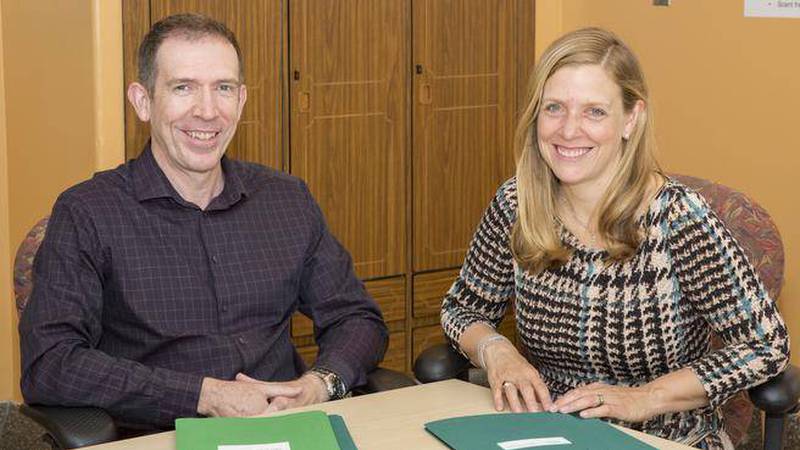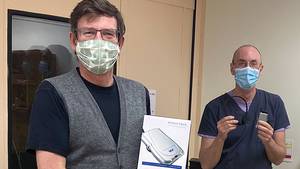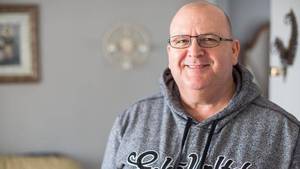Editors note: John’s name has been changed to protect his identity.
For the QEII’s addictions and mental health team, second chances are a key part of recovery. Research shows that 20 to 80 per cent of addictions’ clients have some form of mental illness. A new approach to inpatient care for addictions clients ensures they receive support for both addiction and mental health. Longer lengths of stay, intensive group therapy and increased one-on-one support are some of the recent changes geared to help more people reach their recovery goals.
“Many clients weren’t following up with the next level of treatment after the inpatient program, and many weren’t accessing treatment for co-occurring disorders. For instance, many of our inpatient clients would have a co-occurring mental illness,” explains Rachel Boehm, program leader. “Addressing just the addiction and ignoring the mental illness wasn’t working.”
In 2012, the QEII addictions and mental health programs were integrated, a move that supports collaborative care for clients with co-occurring mental illness and addictions. At the same time, the addictions program launched a new approach to inpatient treatment, including group therapy, recreation therapy, individual counselling, and one-on-one support for housing and other discharge planning.
Dr. Phillip Mills, a psychiatrist with the addictions and mental health programs, says a large number of addictions patients also have anxiety, depressive or bipolar disorders; a smaller percentage have psychotic disorders.
“By virtue of the addiction being the most prominent issue, co-occurring disorders, such as mental health issues, aren’t being considered. That’s often gone undiagnosed because the addiction is the most prominent feature,” says Dr. Mills.
To provide better care for clients, the addictions inpatient unit includes a team of nurses, social workers, a recreation therapist, and a physician. Previously, the unit was made up of nurses only. This multidisciplinary team ensures a more collaborative approach to client care, one that is able to address diverse and complex needs.
“There’s a lot going on in clients’ lives in terms of recovery. They need emotional support and they also need some counselling, so with a multi-disciplinary team we’re able to address those needs in a better way. With longer lengths of stay, we have more time to identify and respond to complex needs such as mental illness or housing, for instance,” says Rachel.
Since launching the new program, the length of stay for an inpatient client has increased from 6.2 days to 16.3 days. In addictions treatment, a longer stay is a good thing.
Another service of the addictions and mental health programs is Community-Based Addictions Services, which offers counselling for clients who don’t yet require an intensive intervention. This service is also used as follow-up care for clients who have been in an intensive program. In the community, clients are supported by a counsellor and group sessions to encourage recovery and prevent relapse. The addictions program also offers support for family members and others affected by a loved one’s addiction.
The number of clients following up with treatment in community-based services after attending an intensive program, is on the rise, increasing from 28.5 per cent to 45.5 per cent over the past year.
When clients stay on track and continue their treatment, the results can be life-changing. Former community counselling client “John” is evidence of the benefits of follow-up care.
Now eight years sober, he went from a social drinker in his earlier years to a progressively heavy drinker. A functioning alcoholic, John held a job in a corporate office environment and would drink at home, alone, every day.
“Drinking was a progressive disease...over the years it crept up on me; it began to take hold of me. The last two years of my drinking, I would get up in the morning and I would consume my day with how I was going to get my drink that night.”
When his relationship with his wife and three kids started deteriorating, alcohol-induced depression set in. John attempted suicide three times before he began recognizing his addiction and the state of his mental health. After visiting the Emergency Department and being admitted to the Nova Scotia Hospital, he made his first call to his addictions counsellor.
After attending Alcoholics Anonymous meetings and working with his counsellor, John’s life has changed dramatically.
“I often consider the mental health and addictions programs to be a group who saved my life. I feel I’ve been given a second chance to be who I want to be, to live the life I always thought I was going to live — I’m very thankful for that.”








